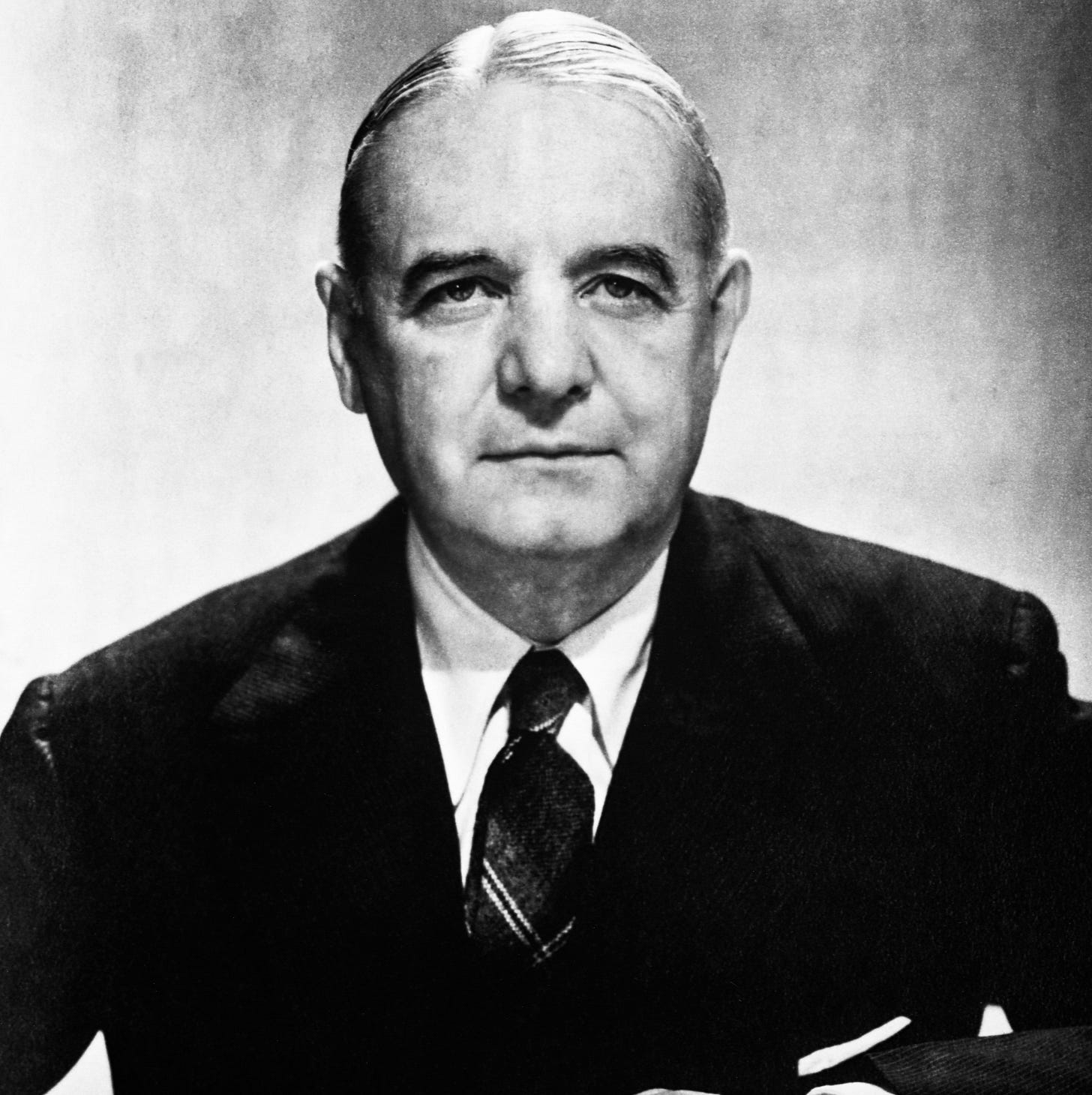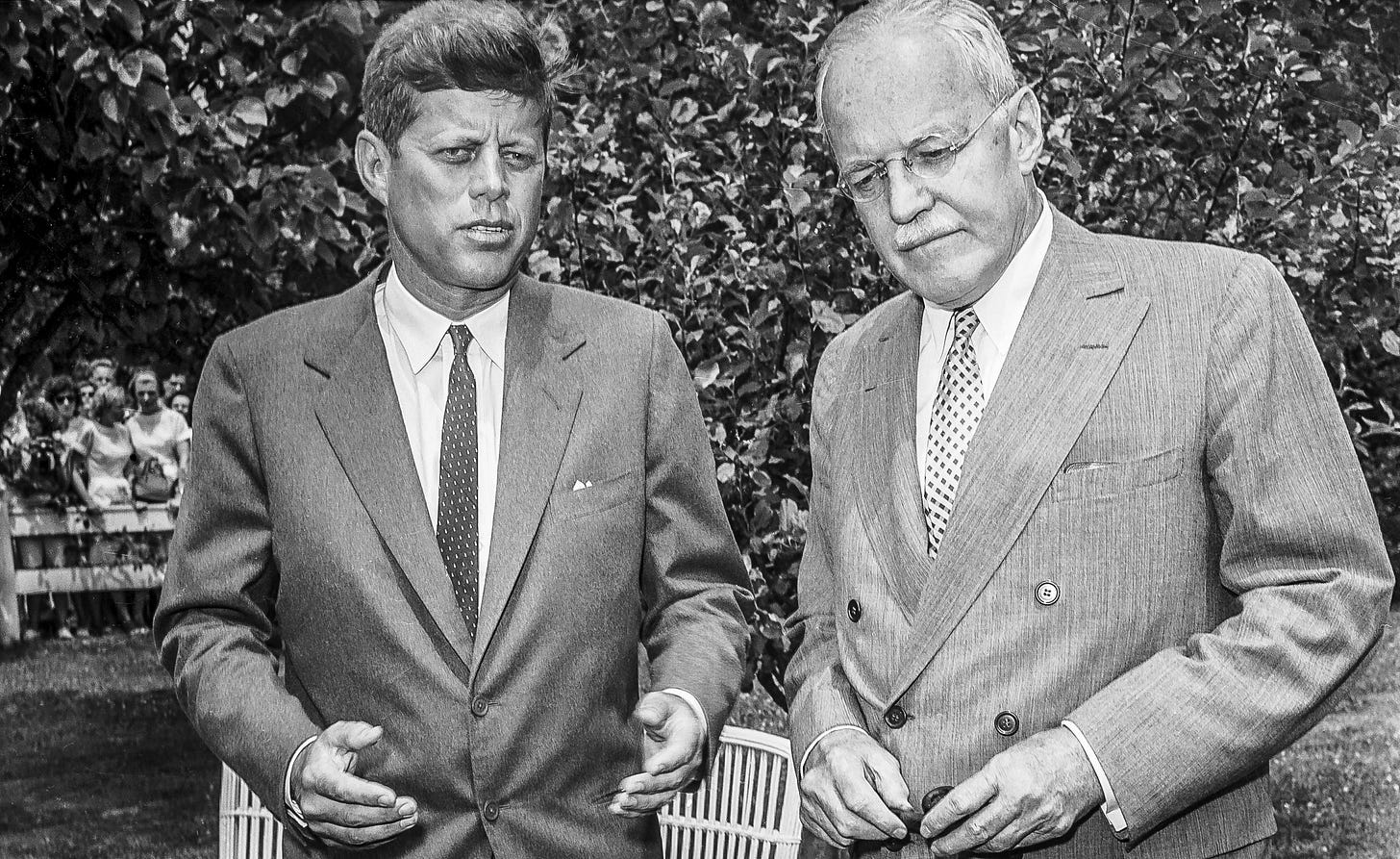“Totalitarian” Powers, Fear, And Psychopathy Behind CIA’s Secret Rule Over U.S.
August 13 | Posted by mrossol | Intelligence ServicesThe agency remains out of control, beyond the law, and a direct threat to democracy and freedom, including in the U.S.
PUBLIC. Michael Shellenberger. 8/13/2025. Source: “Totalitarian” Powers, Fear, And Psychopathy Behind CIA’s Secret Rule Over U.S.
Last week, we published two stories about a senior CIA whistleblower who was one of four CIA analysts who helped write a January 2017 “Intelligence Community Assessment” (ICA) that falsely claimed, with high confidence, that Russian President Vladimir Putin sought to help elect President Donald Trump in 2016. The person said that the CIA Director under Obama, John Brennan, had a “pathological need for control” and put the writers of the ICA “under duress” to include a mention of a fraudulent dossier, commissioned by the Hillary Clinton presidential campaign. The CIA also included in the classified version of the ICA an annex consisting of the dossier written by a former British spy, which went to roughly 200 people in Washington, some of whom leaked related information to journalists.
Unfortunately, the CIA employee said, his employer remains corrupted by “systemic rot” and that crucial steps “have not been put in place” to prevent a Russiagate-like abuse of power from happening again, since the arrival of its new director, John Ratcliffe, in January of this year. “Two critical steps that have not been put in place are,” said the senior analyst turned whistleblower, “to first, formalize expectations about the delivery timeline for sensitive intelligence analyses, and second, to remove the CIA Director from the review process of intelligence reporting or finished analysis.”
In response to questions from Public, the CIA said it was taking necessary reforms. “Director Ratcliffe has overhauled the Agency senior ranks and revoked clearances from bad actors and even created a mission center to better execute on Presidential priorities like the Southern Border. The notion that he’s not making significant reforms or holding people and the Agency accountable is not just ridiculously false but beyond absurd.”
But the CIA’s revoking security clearances and creating a mission center do not address either of the whistleblower’s recommendations, much less the “systemic rot” within the CIA. The whistleblower called for the removal of the Director of the CIA from review and writing of intelligence analysis, and taking a step to avoid rush jobs, like the kind Brennan used to create a deliberately misleading ICA in January 2017.
The whistleblower’s credibility is high. They were one of just four CIA analysts chosen to help write a major ICA. That might make them seem biased toward Brennan, but Ratcliffe has retained the person, rather than fired them, which suggests that the Director or the direct reports he trusts view the person as valuable.
Our sense was that the person was loyal to the CIA, wants to engage in objective apolitical analyses, and wants to remain at the CIA. Their two modest proposed reforms are consistent with loyalty to the CIA. As such, the person is precisely the kind of professional the CIA, Congress, and the American people should want to have in our institutions.
If a legitimate criticism is to be made of the person it would be that they didn’t turn whistleblower earlier, which is the same criticism that could be made against hundreds and perhaps thousands of people involved in the Russiagate hoax.
One might hope that it was just a bad day for the PR people at the CIA, and that Ratcliffe will be out with a new statement this week announcing new reforms, but we are not hopeful. The CIA appears to be following its informal motto, “Admit nothing, deny everything, and make counteraccusations.” That was the advice that former CIA Director Porter Goss said he would give to “a graduating class of CIA case officers” in 2006.
The Russiagate hoax is hardly an unusual scandal in the history of the CIA. The agency has “long gone beyond the borders of American values,” noted Tim Weiner in his 812-page history, Legacy of Ashes. The CIA has murdered its employees, overthrown democracies, propped up dictatorships, tortured innocent people, trained death squads, induced mental illness in illegal medical experiments, spied illegally on law-abiding Americans, and may have been behind the assassination of an American president.
All of these illegal behaviors required cover-ups, many of them elaborate. “Fundamentally, the founding fathers of U.S. intelligence were liars,” said James Angleton, one of the CIA’s founders, and its Director of Counterintelligence for two decades, on his deathbed in 1987. “If you were in a room with them, you were in a room full of people that you had to believe would deservedly end up in hell. I guess I will see them there soon.”

The CIA’s record is poor when evaluated on its own terms. “The CIA was established to prevent unanticipated disasters, such as the Japanese attack on Pearl Harbor,” noted John Judis in 2005, “but it has repeatedly failed to warn the White House of looming threats. It missed the North Korean invasion of the South in 1950, and the Chinese entry into the war that fall; Israel, France, and Great Britain’s attack on the Suez Canal and Egypt in 1956; the Soviet invasion of Czechoslovakia in 1968; the Shah of Iran’s ouster in 1979; the Soviet invasion of Afghanistan that year; the Iraqi invasion of Kuwait in 1990; the Indian nuclear tests in 1998 (‘We didn’t have a clue,’ CIA director George Tenet remarked afterwards); the attack on the World Trade Center in 1993; the bombing of American military barracks in Saudi Arabia in 1996 and of U.S. embassies in Africa in 1998; the attack on the USS Cole in 2000; and of course the attack on the World Trade Center and Pentagon in September 2001.”
The truth, admitted a CIA station chief, “was that the agency at the height of its powers had a great reputation and a terrible record.” It never had a single Soviet spy “who had deep insight into the workings of the Kremlin,” and thus didn’t know communism was collapsing. “The one crime of lasting consequence has been the CIA’s inability to carry out its central mission: informing the president of what is happening in the world,” writes Weiner. Its record in the real world is one of “fleeting successes and long-lasting failures.”
The politicization and weaponization of the CIA for ideological aims has occurred for decades. The CIA’s charter prevents it from spying on Americans and yet it has done so repeatedly, from opening mail to spying on students. Between 1947 and 1963, the CIA was “a dark and invasive force — at home and abroad — violating citizens’ privacy, kidnapping, torturing, and killing at will,” concluded David Talbot in his 686-page history of the CIA, The Devil’s Chessboard.
There were many reforms proposed in the 1970s. In 1975, Congress held hearings, revealing CIA misdeeds around the world, including assassinations using a heart attack gun, and efforts at mind control. Congress then took steps to provide greater oversight of the CIA and more protections for whistleblowers.
Calls for reforms began again in the 1990s after a decade of CIA scandals in the 1980s, which included selling weapons to the Iranian government and illegally diverting the money to an equally illegal war in Central America. In 1991 and 1996, the US Senator from New York, Patrick Moynihan, who had been one of America’s most influential public intellectuals for thirty years, proposed abolishing the CIA entirely and reassigning its various functions to the State Department. The proposal never came up for a vote.
In 1998, America’s intelligence leaders warned the White House that America would suffer “a catastrophic, systemic failure,” unless the U.S. dramatically changed how it gathered and analyzed intelligence. That didn’t happen. Then, in 2001, the CIA failed to communicate with the FBI and thus played a central role in allowing the 9/11 attacks to happen. In 2002, the CIA manipulated intelligence that led to the catastrophic invasion of Iraq.
In response to these failures, Congress in 2004 sought to reform the agency and the broader Intelligence Community. The intent of Congress in passing new legislation was to reduce the power of the CIA, and its Director, and increase the power of a new intelligence coordinator role, which it called the Director of National Intelligence. That didn’t happen.
The “CIA is broken,” wrote John Judis one year later. The 2004 reform act didn’t address the “historical problems with the CIA.” “To repair it,” he concluded, “we may need to start from scratch.” That didn’t happen either.
In 2016 and 2017, the CIA manipulated intelligence to falsely frame the democratically elected U.S. president as a puppet for a foreign power, and from 2016 to 2020, individuals who worked at the CIA oversaw various efforts to control what people are allowed to say on social media. Neither the Russiagate hoax scandal nor the CIA’s role in creating a Censorship Industrial Complex resulted in reform or even serious calls for it by Congress.
Multiple sources tell Public that the CIA remains both the dominant agency of the 18 total in the IC, and the one most resistant to reforms. The Washington Post reported last week that the CIA resisted efforts for greater transparency led by Director of National Intelligence Tulsi Gabbard. And now the CIA has said we should ignore the whistleblowing by one of its most trusted senior analysts, and their demands for reform.
None of this is new. In 1947, the year Congress created the CIA, the Secretary of State at the time, Dean Acheson, said he “had the gravest forebodings” about it and “warned the President that neither he” nor anyone else would be able “to control it.” Between 1947 and 2005 there were 14 major studies by various bodies into how to reform the IC. The CIA “has had an almost perfect record of resisting fundamental changes,” noted Weiner in his 2006 book.
Meanwhile, Congress has failed its Constitutional duty to provide oversight. “The CIA has tried to assassinate foreign leaders, mined harbors, and most recently, tortured prisoners,” wrote Judis in 2005. “If Congress had openly debated these actions, they would not have been approved.” They didn’t and have never much demanded to be able to. Members of Congress “have been derelict in this work for much of the past three decades,” noted Weiner two years later, “but their conduct since 9/11 has bordered on criminal negligence.”
Looking at the full historical record, it is hard not to conclude that the American people only partially govern themselves, that we are burdened with a rogue and violent intelligence agency that continuously interferes not only in foreign elections and governments but also our own, and that many on the Right and the Left who appear to be in a position to change that refuse to do so.
Why is that? Why have Congress and the American people failed for 80 years to reform a rogue intelligence agency that is not only ineffective but also destructive to the point of undermining national security? And what, if anything, can be done about it?
Totalitarian Intelligence

When President Harry Truman signed off on Congress’s creation of the CIA in 1947, all he wanted was a reliable source of intelligence, not an organization focused on overthrowing governments. “It was not intended as a ‘Cloak & Dagger Outfit’!” insisted Truman, complete with the exclamation point, to a friend. “It was intended merely as a center for keeping the President informed on what was going on in the world.”
But, writes Weiner, “His vision was subverted from the start.” That is so much the case that Talbot, in his history of the CIA published eight years after Weiner’s, focuses on the CIA from 1947 to 1963, the year the journalist and historian argues the “intelligence” agency murdered JFK.
The person who had proposed in a letter to President Franklin Roosevelt the creation of the CIA explicitly called for it to be totalitarian in its powers. “In a global and totalitarian war,” wrote General “Wild Bill” Donovan, the head of the Office of Strategic Services (OSS), the predecessor of the CIA, which lasted from 1942 to 1945, “intelligence must be global and totalitarian.”
Roosevelt didn’t trust Donovan and ordered his military aide, Colonel Richard Park, Jr., to investigate the OSS. Park found “no important instance in which the OSS had helped win the war” and in fact had “done serious harm to the citizens, business interests, and national interests of the United States.”
After the White House itself leaked reports that Donovan wanted to create an “American Gestapo,” the president asked Donovan to shelve his plans, which the Joint Chiefs of Staff did in 1945 — only to see them revived by a group of OSS leaders linked to Wall Street bankers.
The CIA has, since its creation, used illegal means to manipulate politicians. The first clandestine action by the CIA was in bribing Italian politicians in 1948.Those efforts continued through the 1960s. The billionaire investor Howard Hughes worked with the CIA to bribe politicians. Hughes’ employee and CIA contractor Bob Maheu “made sweetheart deals with mobsters and allowed the CIA to pay off politicians with Hughes cash,” notes Talbot.
The CIA has long run sex blackmail operations, which it apparently learned from its work with the mafia. While he was at the CIA but before he became CIA director under President Joe Biden, William Burns went to the home of Jeffrey Epstein more than once. Epstein appears to have not only been trafficking in young women, but there is a large and growing body of evidence that he used them to blackmail politicians and others. The New York Times last week showed a photograph of one of the bedrooms in Epstein’s apartment that included a camera aimed at the bed. Of the individuals who were at Epstein’s apartment, many were politicians, including Presidents Bill Clinton and Donald Trump.
There is a well-documented history of the CIA lying to presidents, Congress, and the American people. “The better you lied, and the more you betrayed, the more likely you would be promoted,” said CIA co-founder Angleton on his deathbed. “Outside of their duplicity, the only thing they had in common was a desire for absolute power. I did things that, in looking back on my life, I regret.”
The mainstream media have long been society’s most influential champions of the CIA. The CIA’s first director “counted among his friends not only press barons such as [Time Magazine owner Henry] Luce and New York Times publisher Arthur Hays Sulzberger and TV network moguls like William Paley of CBS, but also leading Washington pundits such as Joseph and Stewart Alsop.”

The CIA before the 1970s “operated with virtually no congressional oversight,” noted Talbot. But in almost all of the cases of CIA abuses, notes Judis, “The CIA was acting under official White House supervision.” The White House was itself directly responsible for the scandals in many cases. The Bush administration pressured the CIA to conclude that there were weapons of mass destruction in Iran, and it appears that President Barack Obama asked for or was in on the joint CIA-FBI effort to frame Trump as a Putin puppet.
Another reason appears to be the CIA’s direct manipulation of Congress. Part of the problem is the latter’s relative transience in contrast to the former’s. A Congressional staffer assigned the task of investigating JFK’s assassination said, “One CIA official told me, ‘So you’re from Congress — what the hell is that to us? You’ll be packed up and gone in a couple of years, and we’ll still be here.’”
Members of Congress are easily bamboozled by intelligence officials, who abuse their knowledge of state secrets by leaking them strategically to politicians, appealing to their egos. Newly declassified FBI reports show Sen. Adam Schiff, did this with classified documents, working alongside the CIA and FBI to paint Trump as a Russian puppet. This has been the case for decades. In 1957, policymakers wrongly trusted intelligence predicting Soviet economic and military superiority “because it was classified,” noted Judis.
Boosting the CIA became a family tradition at the Times. “Young Cy Sulzberger had some uses,” a CIA official told Carl Bernstein of Watergate fame. “He was very eager, he loved to cooperate.” And, over the last two years, the New York Times defended, repeatedly, the censorship efforts of ostensibly “former” CIA employee Renee Diresta, and others linked to the U.S. military, like Kate Starbird.
Through it all, CIA senior executives have displayed psychopathological behaviors. Both Angleton and a CIA Station Chief grew irrationally paranoid about Russian spies, even though there was never any evidence of them. Others didn’t hesitate to consider killing civilians. The CIA’s Rome station chief, Bill Harvey, ordered his contractors to “carry out bombings of Christian Democratic Party offices and newspapers” in Italy “that were to be blamed on the Left.”
Such dehumanizing, psychopathic, and ultimately self-defeating behaviors can be seen time and again in CIA operations including its regime change operations that resulted in dictatorships. Recall that the senior analyst at the CIA called former CIA Director Brennan’s weaponization of the intelligence analysis and writing process as a “pathological need for control.”
In 2024, Congress reauthorized and expanded the controversial Foreign Intelligence Surveillance Act, which allows for warrantless spying on Americans. Before the vote, two members of Congress described to us the manipulation by the CIA of members of Congress as masterful and consisting of telling horror stories about terrorist attacks and wars that would happen if it were to deny the CIA its “totalitarian” spying powers.
When asked about the potential for reform of the IC now, in the wake of the confirmations of the CIA’s central role in Russiagate, Rep. Paulina Luna told Public. “We haven’t been in DC,” referring to the summer recess, “but half of Congress is too scared to push against FISA, etc.” Indeed, some of the main obstacles to IC reform remain the chairs of the Congressional committees responsible for IC reform, several people told Public.

After CIA Director John Brennan first denied and then later admitted that the CIA had spied on the Senate Intelligence Committee’s computers while the committee was investigating the use of torture by the CIA after 9/11, the then-vice chairman of the Senate Intelligence Committee sounded like he was disappointed by the CIA’s behavior.
“Obviously, this is a very serious situation and these are serious violations,” saidSenator Saxby Chambliss, vice chairman of the Senate Intelligence Committee at the time. “The individuals who breached the (committee) computer, I think, are going to have to be dealt with, I think, very harshly by the CIA.” Chambliss then added, “But, it’s in the director’s hands.”
If a nation is going to have a secret intelligence gathering organization, it may not be possible to prevent it from working with psychopaths and the mafia. And there may be some instances when their use might be justified, such as in fighting an existential threat, or a genocidal maniac like Hitler. But if one is going to have such an organization, its powers must be strictly limited, not just under the law, but also institutionally, with far stronger oversight than Congress has been willing or able to give.
Russiagate shows that the CIA continues to get its way by using dirty tricks to control the media and politicians who are supposed to provide oversight to it. Whenever Congress or anyone else urges a restriction on the CIA’s powers, the CIA and its cheerleaders insist that some danger will befall Americans, whether communism, terrorism, or nationalist-populism, without the CIA here to protect us. It’s been the CIA’s big lie for 80 years, and it’s worked.
As such, the underlying reason why Congress and the American people have failed, for so many decades, to reform our rogue intelligence agency and end its secret governance is due to the CIA’s legalized secrecy, its dehumanizing ruthlessness, and its skill in manipulating the media, politicians, and the public into some combination of fearing it and believing that we need it.
More Intelligence, Decentralized

It is, on the one hand, discouraging to read histories of the CIA’s long history of destructive actions around the world, including in the United States as recently as 2016 to 2017, and watch as neither the CIA, the White House, nor Congress take appropriate action to reform the agency so that it stops committing crimes and abusing its powers. The percentage of Americans who would strongly like to see nonpartisan IC reform no doubt remains a minority, probably around the 33% of Americans who told Pew last year that they had an unfavorable view of the CIA, compared to the 44% with a favorable view. “The intelligence community wants control,” said Rep. Andy Biggs (R-AZ) said after FISA was expanded and approved last year. “They want to continue to have control without any checks.”
On the other hand, Right and Left, Republicans and Democrats, are already working together to rein in the IC. “[We got] both left and right to sponsor repeal of FISA,” noted Rep. Paulina Luna. Indeed, the vote on the amendment to require the IC to get a warrant to see the data collected from U.S. citizens was a tie, only failing to pass by one vote. It had highly unusual nonpartisan support: 128 Republicans and 84 Democrats.
Russiagate could increase the size of the coalition committed to nonpartisan IC reform. With Russiagate, the Right has learned that the CIA, FBI, and rest of the IC can be weaponized against them, not just against the Left, as they mostly have been since the beginning of the FBI in 1908 and the CIA in 1947. Indeed, Pew found last year that 50% and 45% of Republicans have an unfavorable view of the FBI and CIA, respectively, and just 37% and 35% of them have a favorable view. And the share of Republicans who rank the two institutions unfavorably likely rises when they learn more about how Democrats weaponized the IC against Republicans. Similarly, the 17% and 22% of Democrats who have an unfavorable view of the FBI and CIA likely rises when they learn more about how the two agencies persecuted Leftists, progressives, and Democrats, disproportionately, in the past.
And the voting public’s view of the CIA and FBI are no doubt being scrambled further now that a Republican president controls both organizations and the wider IC. It’s reasonable to expect approval for both organizations rising among Republicans and declining among Democrats. Partisanship still has a major impact on public opinion. At the same time, the Republican backlash against the decision by President Trump to suppress files relating to Jeffrey Epstein demonstrated real independence of thinking among Trump’s MAGA base, so much so that it surprised the White House.
Moreover, there has not been a better time over the last 80 years to see reform of the IC than today. We are plainly at the end of an 80-year historical cycle that began at the end of World War II, that gave rise to the CIA. And never before has a sitting U.S. president been the greater victim of its machinations. It may be that Trump is the only one to have survived an attack by the CIA, which if the organization’s leading historians are to be believed, got rid of President Kennedy. The Left broadly and Democrats specifically may join a bipartisan coalition for IC reform if they can trust that it is truly nonpartisan and in the public’s interest.
It is not obvious that simply disempowering the CIA’s Director, or removing him from analysis, will prevent the politicization, weaponization, and other abuse of the agency’s powers, as the CIA senior analyst whistleblower recommends. Such a move might instead might empower unelected CIA bureaucrats who are worse for democracy, freedom, and human rights, than the appointee.
The CIA’s underlying problem is the combination of its extraordinary powers and secrecy. It is unlikely that the world’s most important superpower will give up having intelligence agencies that gather secrets; we don’t think it should. But it could stop over-empowering one agency while improving the overall function of the IC.
Congress’ intent in 2004 to empower the DNI above the CIA was never fulfilled. It should be. There are multiple ways this could be done, including by spinning the CIA’s intelligence gathering, analytical, or covert action functions to the Office of the Director of National Intelligence. Whatever is done should reduce the repeated tendency of the CIA to abuse its powers, persecuting the innocent, at home and abroad, and thus distracting it from fighting America’s genuine enemies.
Even if the outcome is a DNI with equal power to the CIA, that would be better than the situation we are currently in, where the whole IC appears more oriented to reform than ever before in its history, with the glaring exception of the CIA, which is publicly ridiculing earnest proposals from within its ranks, and behaving in the same arrogant and defensive posture characterized by what is apparently the agency’s informal mantra: “Admit nothing, deny everything, and make counteraccusations.”





Leave a Reply
You must be logged in to post a comment.